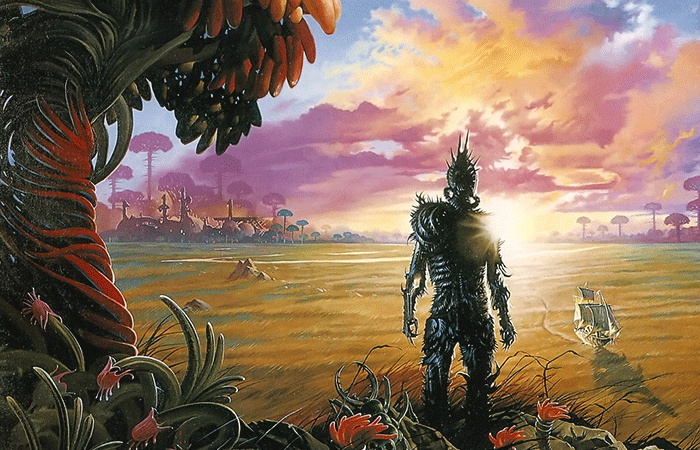Dan Simmons' Hyperion proves that love is better than science
With spaceships and cool monsters and stuff too

Hyperion is what they used to call a "planetary romance"
That's language from back in a time when a romance story didn't have anything to do with relationship drama.
We're going all the way back to the olden days when a romance had to do with a certain kind of character arc.
If you've heard of the Hero's Journey, that whole thing got started with the Bildungsroman...
An overly literal translation into English would be something like "novel of education"
We usually mean it to talk about stories which focus on the personal development of a protagonist.
This sort of story really got popular in the late 18th century thanks to the artistic movement called Romanticism.
Roman -> Romanticism -> Romance
See?
Here's an obligatory spoiler warning for Hyperion 'cause I'm about to spoil the heck out of it. These books are over 30 years old now so this shouldn't be necessary, but I don't want to hear from whiners.
First things first...
What does romantic art have to do with AI and cyborgs in outer space?
A central character, who turns out to be the POV narrator for the books, is a cybernetic recreation of the English romantic poet John Keats.
The Keats entity is a "cybrid" -- cyborg hybrid -- character, an AI that wears the physical body and reconstructed personality of the real-life poet John Keats.
What connection the artifice has to the real historical man and his wild, almost inhuman poetic gifts is left wide open in the story, for good reason.
How can an artificial program created some 800 years after the real man's death have a connection to him?
Turns out that's one of the most interesting questions in this book. We'll get back to this.
The romantic connection is more than this superficial bit of worldbuilding.
The Keats cybrid unites the human form with the artificial.
One of the best and brightest creative minds of our species, gifted in expression of the imagination, realized by mechanical life-forms.
Readers unacquainted with Romantic thought won't follow me here.
Here's a very short and misleading primer on romanticism
Back in the 1790s, a bunch of English and German-speaking artists and philosophers pushed back against the sterile rationalism of Enlightenment thinkers.
After watching the French Revolution, the Terror, and later Napoleon's climb to power, the reaction against Rationalism was inevitable.
These writers rediscovered the ancient Greek world and their art. The Greeks perfected the unity of form and function, art and reason joined to the vitality of living nature.
But there's more here than just a cult of Greek-worship. The Enlightenment opened the door to something new that never existed in the Greek world.
We moderns live in a world of radical freedom.
We're free to question, criticize, choose, and take responsibility for our convictions.
If the ancient Greeks were a perfect expression of the unity and order of man with nature...
The modern post-Enlightenment world was a total breakdown of that harmony.
Instead of giving in to the mythology of the Rationalists, buying the dogma that Reason and Science put away the past as quaint traditions and outdated superstition...
The romantics wanted to preserve what was worthy in the Greek worldview, while at the same time grappling with the problem of human freedom.
They wanted to heal the rupture and bring free, responsible humans back into the natural order.
Philosophy -- which, at the time, meant any systematic body of inquiry and thought -- wasn't up to the task. Reason alone was not sufficient.
Instead, they turned to art, and specifically to the aesthetic experience of art, as a path into truth.
Contrary to some popular views, like the nonsense peddled by the charlatan Steven Pinker, the romantics were not irrationalist opponents of reason.
What they opposed was the Enlightenment belief that reason was a matter of having the right beliefs, and having beliefs organized according to logic.
Aesthetic judgments of fine, beautiful, excellent, noble, and worthwhile objects were their benchmark for rational mental processes.
Enter the namesake "Hyperion" poem
Keats told the epic tale of the war of the Olympian gods against the primordial, grotesque, and mindless Titans that first walked the newly-created world, long before humans took their first breath.
The victory of Zeus against the monsters is a win for Order against Chaos.
Yet in the victory of Order, something vital was lost... an element of creativity and spontaneity.
Modern humans find ourselves lost, cut away from nature by the very freedom that we prize.
Yet we cannot escape our nature as living, breathing animals.
The paradoxical fact of human freedom and our nature as organisms can be reconciled through art and experience.
This has powerful consequences.
What is rational in an experience of art is also entirely personal. There is no such thing as a universal judgment, what we would today call an objective truth.
Objectivity depends on subjective experiences.
But this doesn't lead the romantic into relativism. Subjective feeling belongs to the objective order of nature. In fact, subjective feelings are how nature expresses itself through human imagination and creativity.
It just happens that objectivity must include private experiences and personal freedom.
The conflicted nature of human beings turns out to be reconciled... if you get rid of the belief that rationality is conscious and explicit.
Then there's the Shrike
The Shrike, whose time-travel jaunts shred causality as sure as his blade shred flesh, represents the paradox of freedom and nature.
And this is mega-cool because Simmons uses the Shrike's time travelling from the distant future to show it off.
This chrome-and-steel thorn-plated four-armed horror defies cause and effect, seeding chaos where Rationalists search for certainty.
Its mere existence throws into question all the well-crafted predictive models of the AIs.
Vulgar determinists believe that all events have a sufficient material cause. What came before determines what comes after.
But here, here on Hyperion, there's a hole in time.
Somebody way up in the future is reaching back into the past to mess around with their own history.
There can't be any coherent order of events when that's possible.
What's come after conditions what came before.
That tension between the fixed past and the unrealized possibilities of the future manifest the romantic predicament.
Nature and freedom.
And that's the tension and conflict that drives the romantic Bildungsroman.
We cannot be entirely defined by our pasts... and our future choices cannot escape what we already are.
That tension drives growth.
And...
Human freedom ultimately frustrates the AI bad guys with all their science
We soon learn that the TechnoCore, a mysterious cabal of AI beings, really runs the hyper-technology infrastructure of the local space-opera civilization.
The TechnoCore AIs represent the culmination of objective knowledge. They know a bunch of cool tricks... and make it clear that the humans would never figure most of it out on their own.
It's all impersonal, cold, utilitarian knowledge. These machines are tools, which have no final purpose. They act to secure advantage, but advantage itself is momentary. There is no higher meaning behind it.
Advantage is what secures more advantage.
In the end, this secures their downfall.
If the Shrike clouds their vision with uncertainty, the Keats cybrid represents hope. One faction of the AIs, hoping to live in coexistence with humans, created him with the hope of preventing the war in the future.
Keats represents a higher purpose, symbolized by the human forces holding out against the AI extermination campaign in the distant future.
Keats stands for love, passion, care, concern that spurs on the humans... and in the process, shows them a deeper glimpse into the true nature of reality.
There's even a suggestion that he stands out of time. He is no mere recreation... the cybrid's dreams seem to cut through time and space, connecting him with the creative forces that drove the man John Keats in 19th century England.
This personal experience is the reality that lies beneath all that is expressible in the logic of languages.
It's art, experience, the personal... ultimately, it's love that enables the humans to win over the machines.
The machines may know a great deal about the material condition of the universe... but they don't comprehend anything beyond the surface detail.
That's why Hyperion confounds all their predictive models. They can't see past the uncertainty of freedom.
That the machines do not know art or love, that they are ignorant of Beauty and Goodness, is their downfall.
Yet, as Hyperion and its sequels make it, it's only with and through the machines that humankind comes to this deeper and greater understanding of our own destiny.
The machines were an evil force, and they tried to extinguish us, but without them there would have been no greater destiny.
They represent the past, fate, destiny, our material origins, the obsession of rationalists with perfect knowledge.
What brings them down is the fact that nature and life cannot be quantified into objective knowledge or mathematical formulas.
And in that...
The whole arc of humankind in the story plays out the mythic arc of the Hyperion epic poem. Order succeeds against Chaos, but the victory of Zeus first required his birth from Saturn.
This has to be the most artistic and high-brow take on cyberpunk out there.
Neat trick, if you can pull it off.
By the way – If you liked this article, you'll get to read all the member-only posts if you join us.
Want to leave a comment? You'll need to join us on the inside with a bonus perk for members.
You get to be a part of the private rogue planet community. Leave your thoughts and hang out with other SFF Heretics on the inside, away from the screaming mess of Twitter and the privacy-thieving jumble of Facebook.
There's no charge (yet) to become a member, so click here and join now.

